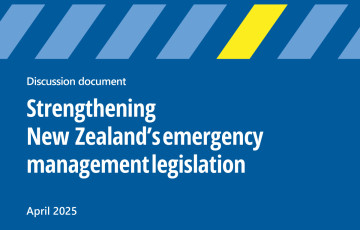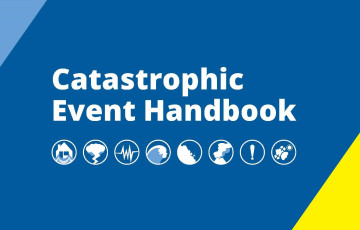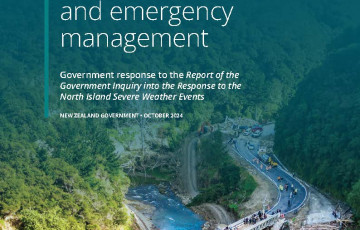Weekly Update from the Cyclone Recovery Unit – 29 May 2023
Update from the Cyclone Recovery Unit
The Cyclone Recovery Unit is working alongside the Cyclone Recovery Taskforce and other Government agencies to support the worst affected regions to recover from the impacts of the North Island floods and Cyclone Gabrielle. This week we have one-page updates from the Ministry for Primary Industries, MBIE and Waka Kotahi. You’ll find them attached below.
The Future of Severely Affected Locations Update
Councils are getting ready to announce their initial categorisation of locations with plans being developed to engage directly with affected communities. This round of engagement will be led locally but is an opportunity for councils to share current thinking on categories, understand the support available to those affected, and will also provide an opportunity for people to raise issues and provide feedback to central government. Officials will then work on those issues and as necessary government will consider changes to the support that will be available.
Is there a difference between the categories and stickers?
In affected regions immediately following Cyclone Gabrielle and the North Island floods, local councils assessed homes and assigned them placards or stickers (for example white, red or orange stickers) as indications of how severely damaged a home was and whether it was safe for people to enter.
On 1 May 2023 the Cyclone Recovery Minister outlined three categorisations of property in areas affected by the severe weather events earlier this year.
The Cyclone Recovery Taskforce has been working with councils and insurance companies to assess the risk status of locations within the regions. This is directly feeding into being able to categorise locations according to risk.
It’s important to note that the colour sticker a house received immediately following the weather event does not necessarily correlate with what category it will ultimately be put in.
Recent announcements
New National Resilience Plan
In Budget 2023 a National Resilience Plan was announced, setting aside $6 billion for strategic investments as part of a National Resilience Plan.
This investment will initially focus on building back better from the recent weather events. It will also include future proofing road, rail, and local infrastructure wiped out by the extreme weather, as well as telecommunications and electricity transmission infrastructure.
Read more HERE
Flood and Cyclone recovery package to rebuild and prepare
The Government has announced a billion-dollar flood and cyclone recovery package as part of Budget 2023 that covers the basics of rebuilding roads, rail and schools while preparing for future events with a big investment in flood protection measures.
The Package includes funding to:
- Rebuild and repair roads, rail and repair and rebuild all weather-hit schools
- $100 million in flood protection to prevent future flooding; read more HERE
- Child mental health support to be provided to all primary and intermediate schools in Hawkes Bay and Tairāwhiti via Mana Ake. Read more HERE
- Investment in job training and employment
Read more HERE
Finding Support
Mental Health
Where to get mental health support
Budget 2023 included new investment of $10 million for community-led mental health and wellbeing support, including extending the Mana Ake programme developed following the Christchurch quakes into every school in the Hawke’s Bay and Tairāwhiti.
Mana Ake – Stronger for Tomorrow is a holistic school-based mental wellbeing programme that helps give primary and intermediate school-aged tamariki the resilience and support they need, when they need it, to cope with the challenges that life can throw at them. It includes whole-of-classroom, group-based and individual programmes and supports. It also provides advice, guidance and workshops for parents, whānau and teachers.
Te Whatu Ora funds a number of free and easily accessible wellbeing supports.
These include face-to-face primary mental health and addiction support via participating GPs clinics, Kaupapa Maori, Pacific and Youth specific services. These services are free and available without a referral.
Where you can seek help
- Log on to wellbeingsupport.health.nz to find a service close to you or you can call or text Need to Talk 1737 any time to talk with a trained counsellor.
- At most general practices you can phone and book in to see a Health Improvement Practitioner (HIP), a registered mental health professional who provides advice and support promoting self-management, and connects people to other services they may need. Every day, HIPs have appointments that are not pre-booked so you can phone a general practice where you are enrolled and book in on that day.
- The Depression Helpline – Call 0800 111 757 or text 4202 to talk to a trained counsellor about how you are feeling or to ask any questions.
- Youthline – Call 0800 376 633, text 234, email talk@youthline.co.nz, or go to co.nz for an online chat.
- The Lowdown – Text 5626 for support to help young people recognise and understand depression or anxiety.
- Healthline – Call 0800 611 116 for health advice and information.
- Alcohol Drug Helpline – Call 0800 787 797 to speak with a trained counsellor.
- Tips and support, go to org.nz.
Free wellbeing apps
- You can download the Groov and Headstrong wellbeing apps free for android and Apple phones. Just go to Google Play or the Apple app store.
Rural Support Trusts
A local Rural Support Trust (RST) is a great place to access free and confidential support and advice. This nationwide network, run by local people, helps farming families and rural communities.
RSTs have facilitators trained to recognise issues with mental health and wellbeing. They can also put you in touch with services including health information or financial support.
Communities and People
Community groups and contracted social sector providers of food and other supports, including services for disabled people have mobilised quickly to support people, families and communities affected by the recent North Island floods and Cyclone Gabrielle. The increase in demand for this support is putting a strain on services and community-led initiatives. There is a Community Support Package aims to relieve some of this pressure so community groups and contracted providers can continue to deliver their response and recovery efforts for people, whānau and communities. See more here: Community Support Package for people impacted by North Island floods and Cyclone Gabrielle - Ministry of Social Development (msd.govt.nz)
Also, check out Te Whatu Ora’s resources here: https://www.tewhatuora.govt.nz/keeping-well/cyclone-support/
The Temporary Accommodation Service is supporting those who have been displaced. Find out more here: Temporary Accommodation Service » Temporary Accommodation (mbie.govt.nz)
The Ministry of Business, Innovation and Employment has launched the New Zealand Claims Resolution Service to advise and support homeowners to resolve residential insurance issues. This can include legal, engineering and wellbeing support. More details here: New Zealand Claims Resolution Service (nzcrs.govt.nz)
Business
More than 3500 small businesses have been approved for grants to support their recovery. Businesses can apply for a grant of up to $40,000 to help them keep operating, maintain cashflow and position them for a successful recovery. There is more detail on support available to businesses here: Cyclone and flood recovery for businesses — business.govt.nz and here: Employer support for Cyclone Gabrielle in Tairāwhiti and Hawke's Bay - Work and Income
Support for Māori
Te Puni Kōkiri is distributing $9m of the $15m allocated to support Māori recover from Cyclone Gabrielle through the Cyclone Gabrielle Māori Communities Response Fund providing:
- Capacity support such as relief staffing, clean-up expenses, generators and communication equipment
- Recovery planning and co-ordination funds
- Marae infrastructure and support funds such as securing temporary storage for taonga and food.
At the end of April 2023, $7.84m has been committed, is being processed or is under discussion across affected regions of Ikaroā-Rāwhiti – Takitimu, Ikaroā-Rāwhiti – Tairāwhiti, Te Tai Tokerau, Tāmaki-Makarau and Waikato-Waiariki.
Te Puni Kōkiri kaimahi are also helping whānau identify and connect into other recovery focused government funds. The Ministry has an important role in times like these, to support other agencies to understand and reflect the needs of whānau Māori in their recovery approaches.
For enquiries about Te Puni Kōkiri funding in cyclone affected regions contact a Te Puni Kōkiri regional office.
Government support to date
- An initial $250 million for Waka Kotahi and local councils to assess and fix roads
- $74 million for affected farmers and growers to clean up and re-establish their businesses
- $75 million for businesses with immediate costs and clean-up – to be distributed by local delivery partners in the affected regions
- $5 million to Mayoral Relief Funds
- More than $65.8 million in Civil Defence Payments
- Inquiry announced into forestry slash and land use after Cyclone Gabrielle
- A new Recovery Visa created to help bring in additional specialist workers
- Temporary Accommodation Service activated in affected regions
- Cyclone Gabrielle Appeal Fund Launched along with a special Lotto Draw on Saturday 18 March
- $15 million short-term relief package to support Māori communities
- A further $17.5 million to support communities and community providers
- $3.25 million to support the immediate mental wellbeing needs of people impacted by Cyclone Gabrielle
- $15 million for councils to remove rubbish
- $133.2 million for Hawke’s Bay and $38.8 million for Tairāwhiti to remove silt from residential, commercial properties and whenua Māori.
- $275 million for Waka Kotahi and local councils to repair affected roads
- $200m to repair railways
- $117 million to repair, re-develop or relocate schools affected by the severe weather
- $100 million in flood protection to prevent future flooding
- $35 million for mental health initiatives
- $10.5 million to remove slash and debris in Hawke’s Bay and Tairāwhiti
One-page summaries
- Ministry for Primary Industries Cyclone Gabrielle Recovery Report 22 May 2023 (.pdf 513kb)
- Ministry of Business, Innovation and Employment recovery at a glance 29 May 2023 (.pdf 124kb)
- Waka Kotahi Cyclone Gabrielle Recovery Activity Weekly Update 25 May 2023 (.pdf 210kb)
Published: May 29, 2023, 5:03 PM



